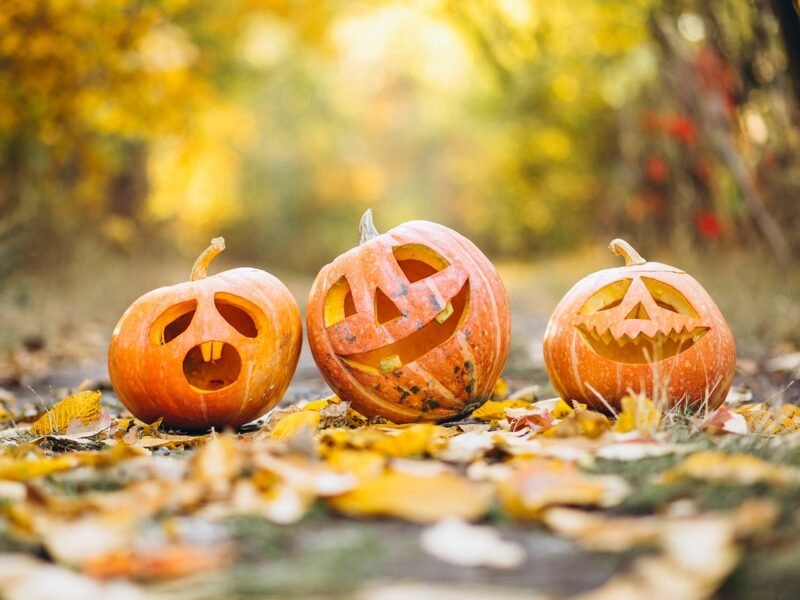Pumpkins and Pickleball
Over twelve years ago, before Collective Resource Compost was born, Evanston had this program for repurposing 65-gallon garbage cans that had been made holey by squirrels. By taking off the wheels, drilling more holes into them and stenciling compost on the sides, they transformed them into compost bins. I had one of these in my backyard. One fall, I put our spent jack-o’-lantern into it. Because I had begun composting through CRC, I kind of forgot about that pumpkin. Months later, I wondered what had happened to it. Had it partially composted or was it still pretty intact? I opened up the bin and much to my surprise, it had completely biodegraded! My first thought was that someone, either human or animal, had taken it, but there really wasn’t any evidence of that. From that point forward, I started calling composting magic.
Pumpkins are mostly water, like watermelons, except we don’t think of them this way because they don’t have water in their name. I think we should start calling them watersquashes. Who’s with me?
I love eating pumpkins but I really hate carving them. I just don’t think it’s safe. Add children into the mix and it seems like a recipe for disaster. I seem to be in the minority.
I got curious about how the whole pumpkin carving tradition got started. Apparently, we have the Irish to thank for it. This is very funny to me because I am mostly Irish. But it wasn't just pumpkins that were carved. Sometimes it was root vegetables like turnips. The Wikipedia page for jack-o’lanterns is pretty amusing with photos of a creepy mummy-like plaster cast of a turnip jack-o’lantern, an actual turnip jack-o’lantern and a pumpkin carved to look like Wikipedia’s logo.
I had this vague memory that Illinois produced more pumpkins than any other state. This was confirmed by the USDA website. In 2021, Illinois had more than twice the pumpkin-growing acreage as the rest of the big producers. The other states are California, Indiana, Michigan, Texas, and Virginia.
This is all a lead-up to encourage you to compost all of those pumpkins. There are so many different ways.
Our friends at Go Green Winnetka and Illinois Food Scrap Coalition created and distributed this article explaining how A Smashed Pumpkin is Better than a Rotted One. You can read it on Go Green Winnetka’s website or download a colorful one-pager here.
Smashing Pumpkins
Pumpkin Smashes are really having their moment. Our friends at SCARCE, a gem of an organization that we are lucky to have in Illinois, headed by Kay McKeen, have been ahead of the curve on the pumpkin composting front. They have hosted Pumpkin Smashes beginning in 2014! They have a section on their website devoted to them which includes a database with a map of the smashes that have been registered with them and a guide for how to host one.
A lot of park districts and public works departments are hosting events. I love the creativity that went into Park Ridge’s Pumpkin Smash and Bash. Participants roll their pumpkins down a sledding hill, smash them and then catapult them into a pile.
Low-key Pumpkin Composting
If you have just one or two pumpkins you can leave them with your bucket or tote and we’ll compost them free-of-charge. We like to encourage customers to gather their pumpkins in a box or bag to make things easier for our drivers. If they have other pumpkins out on display that should not be picked up, they should find a way to make that extra clear for the driver. And of course, this can happen whenever you want to add them to your regular pickup.
If you have greater quantities, you might consider ordering a tote or totes for you and your neighbors. In 2020, we posted a blogpost called Host a Pumpkin Smash: Halloween Fun That’s Good for the Planet that encourages you to host your own hyper-local event.
Pumpkin Smashes and Pickleball
So what do Pumpkin Smashes and Pickleball have in common? Besides the obvious same first letter? Pickleball is also having a moment! And it’s about time, since I hear that it was invented in 1965. I don’t know if it’s because I’m a woman of a certain age but I just keep hearing about it. My best friend’s mom plays it. My synagogue's cantor plays it. My boss’s wife plays it. I’ve been seeing yard signs about pickleball lessons and I don’t think I’m hallucinating. There’s even a USA Pickleball Association. They might be slightly biased but they describe the game as fun, social and friendly. The association helps organize tournaments and Evanston’s McGaw YMCA has its first-ever coming up on two Sundays this November.
All this got me wondering about how it compared with the game of squash. And, as it often does, the internet provided. An article from May 2021 describes Squickleball, a curious combo of squash and pickleball that was invented by members of Montreal’s Atwater Club to adhere to public health regulations during the pandemic. Funny! I wasn’t expecting that.


